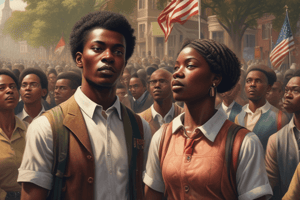Podcast
Questions and Answers
What was the significance of the Montgomery Bus Boycott in the Civil Rights Movement?
What was the significance of the Montgomery Bus Boycott in the Civil Rights Movement?
- It introduced new segregation laws in Alabama.
- It resulted in increased racial discrimination.
- It demonstrated the effectiveness of nonviolent resistance. (correct)
- It led to the arrest of Rosa Parks.
How long did the Montgomery Bus Boycott last before the US Supreme Court declared segregated seating on buses unconstitutional?
How long did the Montgomery Bus Boycott last before the US Supreme Court declared segregated seating on buses unconstitutional?
- 150 days
- 381 days (correct)
- 1 year
- 2 years
What was the main outcome of the Supreme Court's decision in Brown v. Board of Education?
What was the main outcome of the Supreme Court's decision in Brown v. Board of Education?
- It introduced more discriminatory laws in schools.
- It declared racial segregation in public schools unconstitutional. (correct)
- It supported the constitutionality of racial segregation in public schools.
- It abolished the Civil Rights Act of 1964.
Which event directly led to the start of the Montgomery Bus Boycott?
Which event directly led to the start of the Montgomery Bus Boycott?
What did the Civil Rights Act of 1964 primarily aim to achieve?
What did the Civil Rights Act of 1964 primarily aim to achieve?
What major doctrine did the Brown v. Board of Education decision overturn?
What major doctrine did the Brown v. Board of Education decision overturn?
Which legislation passed in 1964 outlawed discrimination based on race, color, religion, sex, and national origin?
Which legislation passed in 1964 outlawed discrimination based on race, color, religion, sex, and national origin?
What major achievement was attributed to the Civil Rights Act of 1964?
What major achievement was attributed to the Civil Rights Act of 1964?
Which event is considered a significant milestone in the Civil Rights Movement's history for paving the way for desegregation of schools and public facilities?
Which event is considered a significant milestone in the Civil Rights Movement's history for paving the way for desegregation of schools and public facilities?
What was the Supreme Court case that was a major victory for the Civil Rights Movement by ending legal segregation in schools?
What was the Supreme Court case that was a major victory for the Civil Rights Movement by ending legal segregation in schools?
Flashcards are hidden until you start studying
Study Notes
The Civil Rights Movement was a mass protest movement that aimed to end racial segregation and discrimination in the southern United States. It had its roots in the centuries-long struggle of African Americans and their descendants to resist racial oppression. The movement gained momentum in the 1950s and 1960s, with key events such as the Montgomery Bus Boycott, the landmark Supreme Court case Brown v. Board of Education, and the passage of the Civil Rights Act of 1964.
Montgomery Bus Boycott
The Montgomery Bus Boycott was a political and social protest campaign against the policy of racial segregation on the public transit system of Montgomery, Alabama. The boycott began on December 1, 1955, and lasted for 381 days, until the US Supreme Court ruled that the city's policy of segregated seating on buses was unconstitutional. The boycott was sparked by the arrest of Rosa Parks, an African American woman who refused to give up her seat on a bus to a white passenger. The boycott was a significant turning point in the Civil Rights Movement, as it demonstrated the power of nonviolent resistance and galvanized public support for the cause of civil rights.
Brown v. Board of Education
Brown v. Board of Education was a landmark decision by the Supreme Court of the United States in 1954. The case challenged the constitutionality of racial segregation in public schools, and the Court ruled that segregation was unlawful and violated the Equal Protection Clause of the 14th Amendment. The decision effectively overturned the "separate but equal" doctrine established by the Plessy v. Ferguson case in 1896. The Brown v. Board of Education decision was a major victory for the Civil Rights Movement, as it paved the way for the desegregation of schools and other public facilities.
Civil Rights Act of 1964
The Civil Rights Act of 1964 was a landmark civil rights and labor law in the United States that outlawed discrimination based on race, color, religion, sex, or national origin. The Act was passed by Congress and signed into law by President Lyndon B. Johnson on July 2, 1964. The Civil Rights Act of 1964 prohibited discrimination in employment, education, and public accommodations, and it also banned segregation in schools, transportation, and public facilities. The passage of the Civil Rights Act of 1964 was a major achievement of the Civil Rights Movement, as it helped to end legal segregation and discrimination in the United States.
In conclusion, the Civil Rights Movement was a pivotal period in American history that saw the struggle for civil rights and the end of legal segregation. Key events such as the Montgomery Bus Boycott, Brown v. Board of Education, and the passage of the Civil Rights Act of 1964 were significant milestones in the movement's history. Despite these achievements, the struggle for civil rights and equality continues to this day.
Studying That Suits You
Use AI to generate personalized quizzes and flashcards to suit your learning preferences.




